
A TAP aceita o transporte de animais de estimação na cabina ou no porão, dependendo da espécie, idade, tamanho e peso, da disponibilidade de espaço e do equipamento planeado para operar a rota, e tendo em conta as regras do país de destino.
NOTAS IMPORTANTES
- Para voos com origem fora dos Estados-Membros da UE, e com destino final em Portugal, é obrigatório o preenchimento e envio do formulário para comunicação de chegada. O passageiro deve fazê-lo com a maior antecedência possível e para os contactos indicados no website da Direção Geral de Alimentação e Veterinária (website do formulário), no máximo até 48h antes da chegada.
- Os Passageiros a viajar com AVIH/PETC não são aceites se tiverem voos de ligação operados pela G3 e/ou AD no Brasil.
Esta regra aplica-se a todos os voos operados por estas companhias, mesmo que o número de voo marketing seja TP.
- Nas reservas PETC e AVIH, é extremamente importante que os dados introduzidos no pedido de serviço estejam correctos.
Os pesos introduzidos devem ter sempre em conta o peso total do animal + a transportadora.
- Certifique-se sempre que:
- o peso introduzido é o correcto.
- as medidas da transportadora são correctas, bem como a espécie e raça do animal;
- o pedido do serviço se encontra confirmado na reserva.
Condições Gerais
O nosso serviço de transporte de animais de estimação está sujeito:
- à disponibilidade de espaço no avião.
- à cabina em que o passageiro viaja e o tipo de avião.
- à aceitação do animal no país de destino.
- ao tipo de animal e peso total combinado do animal e da transportadora.
- à idade do animal - deve ter pelo menos 12 semanas de idade (10 semanas para viagens dentro de Portugal Continental, Açores, Madeira e Espanha ou quando transportado na cabine).
Por este motivo, deve ser solicitado no momento da reserva da viagem, ou antes do voo, preferencialmente com uma antecedência mínima de 48 horas em relação à partida.
Note-se que as informações desta página se aplicam aos voos operados pela TAP Air Portugal. Se o voo tiver uma ligação com outra companhia aérea, por favor verifique a possibilidade de transportar animais de estimação com essa companhia.
Para saber se é possível transportar um animal de estimação num voo e o respectivo custo, deve fornecer as seguintes informações ao solicitar este serviço:

|
Espécie e número de
animais a transportar
Apenas cães e gatos podem ser
transportados na cabina ou no porão.
Todos as outras espécies devem ser
transportadas pela TAP Air Cargo.
Cada passageiro pode transportar consigo sem caráter comercial, até 5 animais1
|
Dimensões e tipo de transportadora
(CxLxA)
Indique o tipo, o comprimento, a altura e a largura da transportadora em que é pretendido levar o animal.
Apenas as transportadoras maleáveis são aceites na cabina. Caso a transportadora seja rígida, o animal terá que viajar no porão.
|
O peso total a transportar (transportadora + animal)
O peso combinado do animal e da transportadora vai determinar se o animal de estimação viajará na cabina ou no porão.
Se o peso total não exceder 8kg, o transporte será efetuado na cabina. Animais + transportadoras com pesos superiores serão transportados no porão.
|
Dependendo do tamanho e/ou peso (do animal e da caixa de transporte), os animais podem ser aceites:
- na cabina - PETC (até 08Kg)
- no porão - AVIH (até 45Kg)*
- como carga - AVI - para mais informações/condições contacte o departamento de Carga localmente)
* Em certas rotas, por lei, o peso máximo será limitado a 32 kg. Para/de/via os seguintes dos países só é aceite AVIH até 32kgs (total animal + transportadora):
✓ EUA
✓ Hungria
✓ França
✓ Países Baixos
NOTAS IMPORTANTES
1 De acordo com o Regulamento Comunitário, só pode ser transportado sem caráter comercial, o máximo de 5 animais por passageiro, cumulativamente, entre cabina e porão.
- Na cabina, cada passageiro pode transportar apenas uma transportadora maleável, no entanto, esta pode conter, no máximo, dois animais da mesma espécie desde que estejam habituados a conviver e desde que tenham espaço para se movimentarem dentro do saco/transportadora.
- No porão, o número máximo de animais de estimação que pode acompanhar o passageiro não pode ser superior a 5.
O máximo de 5 animais por passageiro só poderá ser excedido se:
- o transporte tiver por objectivo a participação em concursos, exposições ou eventos desportivos, bem como em treinos para esses eventos;
- for apresentado comprovativo escrito da inscrição nesses eventos ou em associação que os organiza;
- os animais em questão tiverem mais de 6 meses de idade.
Dados fictícios ou falsos
Nas reservas PETC e AVIH, é extremamente importante que os dados introduzidos no pedido de serviço estejam correctos.
O peso introduzido deve ter sempre em conta o peso total do animal + transportadora. Verifique se o peso introduzido é o correcto. Certifique-se também de que as medidas da transportadora são as corretas, bem como a espécie e raça do animal.
A introdução de dados fictícios ou falsos, bem como as dimensões inadequadas da transportadora ao animal a transportar, pode resultar em atrasos ou mesmo na recusa de embarque.
Controlo no Aeroporto / Checklist
Informamos que, de acordo com a Regulamentação IATA, é obrigatório efetuar um checklist de aceitação para AVIH e PETC. Deste modo, solicitamos que informem os clientes que será feita uma verificação para aceitação, no aeroporto.
É responsabilidade do passageiro:
- ter toda a documentação do animal na sua posse, quer em relação ao estado de saúde do animal, quer em relação às regras de entrada no país de destino (aconselhamos os passageiros a contactarem o veterinário ou as entidades governamentais competentes dos países de origem e destino.);
- providenciar uma transportadora adequada para o transporte em conformidade com as regras da TAP.
- fornecer os alimentos e água necessários para a viagem.
Este serviço é pago e não é reembolsável, exceto para animais de assistência - SVAN
No caso da viagem envolver mais de uma companhia aérea
É necessário contactar as companhias envolvidas no itinerário para solicitar o serviço, e verificar regras e valores. Antes de reservar um animal num voo em code-share operado por uma companhia parceira, verifique primeiro se essa companhia permite reserva deste serviço no voo marketing TP.
Caso a viagem implique voo com escala, tenha em conta que:
- Consoante o itinerário e o peso total combinado (animal + transportadora), o animal poderá ter de fazer parte do percurso na cabina e outra parte no porão – é o caso dos voos entre Estados Unidos e Europa (por exemplo, Nova Iorque - Lisboa - Madrid).
- Se o animal vai ser transportado tanto na cabina como no porão, deve garantir que o tempo de ligação (tempo entre dois voos) é de, no mínimo, 3 horas, para assegurar que todos os processos e diligências necessários são completados.
- Se o animal viajar na cabina e passar para o porão no segundo percurso, deve providenciar-se a caixa transportadora no ponto de origem.
NOTE
As companhias G3 bem como a AD, não aceitam pedidos do serviço de AVIH / PETC em reservas de interline ou voos code-share. Também o Grupo LA tem algumas restrições.
| Service |
AD (AZUL) |
G3 (GOL) |
LA (LATAM) |
| AVIH |
X |
X |
OK
exceto para os animais de focinho curto ou achatado
|
| PETC |
X |
X |
OK
exceto para os animais de focinho curto ou achatado
|
Em todos os casos em que o passageiro possua voos TAP Air Portugal e deseje reservar o serviço de AVIH / PETC em ligações internas no Brasil com a companhia G3 ou AD, deverá ser feita uma reserva somente para os voos TAP e emitido o bilhete só para os percursos TP.
Para contratar o serviço AVIH / PETC, o passageiro deverá contactar directamente a G3 ou AD para reservar o seu voo interno e emitir o bilhete em separado. Em nenhuma circunstância deverão ser reservados os voos G3 ou AD com a TAP, desde que os serviços acima estejam envolvidos.
Nas situações em que não haja code share envolvido e apenas voos TAP e voos puros AD / G3 ou LA no mesmo bilhete e o passageiro consiga efetuar a reserva do serviço com o parceiro, deve enviar à TAP a cópia da confirmação do serviço, bem como a cópia do EMD emitido. A área de space control da TAP confirmará, assim, o serviço do nosso lado.
PETC - Animais na Cabina
Transporte de animais de estimação na cabina
Só podem ser transportados na cabina cães e gatos, em transportadora maleável própria com um peso total (animal/animais + transportadora) de até 8kg / 17lbs. Esta transportadora deverá ser acomodada no espaço debaixo do assento, que possui 45x30x23cm. Todos os animais de estimação (com exceção dos cães de assistência) que excedam este peso terão que ser transportados no porão.
|
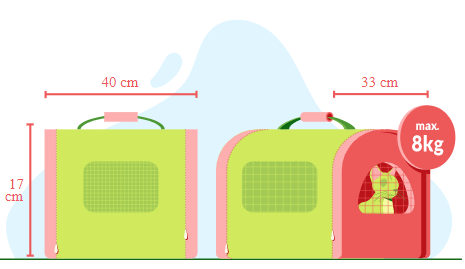
|
- SSR PETC - Pequenos animais domésticos (cães e gatos):
- SSR SVAN - Animais de assistência (cães-guias de cegos e surdos, cães de assistência a pessoas com mobilidade reduzida, com incapaciade psicológica e cães de busca e salvamento), independentemente do peso.
|
Condições obrigatórias para o transporte de animais na cabina:
Para garantir a segurança e bem-estar de passageiros e animais, o transporte de animais de estimação na cabina deve cumprir as seguintes condições:
- Apenas cães e gatos podem ser transportados na cabina.
- Cada passageiro pode levar apenas uma mala/saco maleável de transporte de animais e a mesma pode conter até dois animais da mesma espécie.
- Não é permitido o transporte de cães/gatos na cabina Executiva dos voos de longo curso (exceto cães de assistência em alguns destes voos).
A transportadora de cabina tem que:
- Ser maleável.
- Ter espaço suficiente para o(s) animal(is) se mover(em) dentro do saco/transportadora.
- Os animais devem caber completamente na transportadora (incluindo cabeça e cauda).
- Ser estanque (para reter os fluídos do animal).
- Ser acomodada debaixo do assento à frente do passageiro para não obstruir a passagem na cabina.
O animal:
- Deve ter a idade mínima de 10 semanas.
- Tem que estar totalmente dentro da transportadora durante todo o voo (inclui cabeça e cauda).
- Deve estar limpo, saudável e isento de odores.
- Não pode ocupar um lugar nem movimentar-se na cabina.
- Não pode constituir ameaça ou perturbar os passageiros.
- Se for fêmea, não pode estar prenha.
Outras condições:
- Os passageiros com PETC não podem ser aceites nas filas de emergência, nem nas primeira filas após as anteparas. Pode aplicar-se a atribuição de lugares específicos aos passageiros.
- O transporte de pequenos gatos ou cães pode ser feito em Classe Económica e em Classe Executiva na maioria dos equipamentos TAP (não permitido na Classe Executiva em aviões de longo curso, exceto cães de assistência - SVAN). A disponibilidade do serviço deve ser sempre verificada.
- Um menor não acompanhado (UMNR) não pode levar um PETC.
- O transporte de animais na cabina está sujeito aos regulamentos governamentais
- Cada passageiro pode transportar apenas uma transportadora maleável, no entanto, esta pode conter, no máximo, dois animais da mesma espécie desde que estejam habituados a conviver e desde que tenham espaço para se movimentarem dentro do saco/transportadora.
A TAP reserva-se o direito de recusar o transporte do animal de estimação na cabina, e de transferi-lo para o porão, caso considere não estarem reunidas todas as condições necessárias para este tipo de transporte.
Exemplos de transportadoras maleáveis permitidas na cabina
Exemplo de Entradas de GDS - PETC
Amadeus
SRPETC- CAT PERSIAN 45X30X23CM/8KG /P1
SRPETC- DOG CHOWCHOW 45X30X23CM/5KG/P1/S2
Galileo
SI.P1S1/PETC*CAT PERSIAN 45X30X23CM/8KG
SI.P1S1/PETC*DOG CHOWCHOW 45X30X23CM/5KG
Sabre
3PETC/8KG 45X30X23CM 1PERSIAN CAT-1.1
3PETC/5KG 45X30X23CM 1DOG CHOW CHOW-1.1
NOTAS IMPORTANTES
1 De acordo com o Regulamento Comunitário, só pode ser transportado sem caráter comercial, o máximo de 5 animais por passageiro, cumulativamente, entre cabina e porão.
- Na cabina, cada passageiro pode transportar apenas uma transportadora maleável, no entanto, esta pode conter, no máximo, dois animais da mesma espécie desde que estejam habituados a conviver e desde que tenham espaço para se movimentarem dentro do saco/transportadora.
- No porão, o número máximo de animais de estimação que pode acompanhar o passageiro não pode ser superior a 5.
O máximo de 5 animais por passageiro só poderá ser excedido se:
- o transporte tiver por objectivo a participação em concursos, exposições ou eventos desportivos, bem como em treinos para esses eventos;
- for apresentado comprovativo escrito da inscrição nesses eventos ou em associação que os organiza;
- os animais em questão tiverem mais de 6 meses de idade.
Dados fictícios ou falsos
Nas reservas PETC e AVIH, é extremamente importante que os dados introduzidos no pedido de serviço estejam correctos.
O peso introduzido deve ter sempre em conta o peso total do animal + transportadora. Verifique se o peso introduzido é o correcto. Certifique-se também de que as medidas da transportadora são as corretas, bem como a espécie e raça do animal.
A introdução de dados fictícios ou falsos, bem como as dimensões erradas da transportadora ou dados errados do animal a transportar, pode resultar em atrasos ou mesmo na recusa de embarque.
Controlo no Aeroporto / Checklist
Informamos que, de acordo com a Regulamentação IATA, é obrigatório efetuar um checklist de aceitação para AVIH e PETC. Deste modo, solicitamos que informem os clientes que será feita uma verificação para aceitação, no aeroporto.
PETC/SVAN
Não é possível associar PETC e SVAN ao mesmo passageiro. O sistema está parametrizado para não permitir esta dupla associação e irá responder:
"NO PETC/SVAN CAN BE BOOKED FOR THE SAME PAX PLEASE BOOK PETC AS AVIH"
Mudança de condição de transporte - PETC/AVIH
Sempre que a condição de transporte do animal não for a mesma para toda a viagem, ou seja, se o animal for transportado numa parte da viagem como AVIH e na seguinte como PETC, ou vice-versa, são necessárias 3 horas entre voos no ponto de transferência.
AVIH - Animais no Porão
Transporte de animais de estimação no porão
Apenas cães e gatos podem ser transportados no porão, em transportadora rígida própria, desde que apresentem um peso combinado (transportadora + animal/animais) de:
|
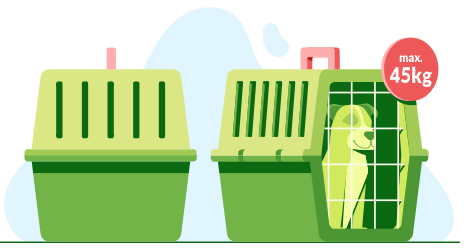
|
- SSR AVIH:
- até 32kg / 70lbs, nos voos com destino, origem ou escala nos EUA, Hungria, França e Países Baixos
- até 45kg / 99lbs, para os restantes destinos.
O peso máximo indicado é da (caixa transportadora + animal), sendo despachado no check-in.
Animais com peso superior ou que viajem em transportadoras de dimensões fora do comum, terão de ser aceites e transportados como carga. Para reserva e cotação deverá ser contactada a TAP Cargo.
Na entrega do animal, será verificada uma Checklist identificando toda as condições de aceitação e assinado o Termo de Responsabilidade que consta da mesma.
|
Condições obrigatórias para o transporte de animais (+caixa) até 45kg no porão:
Para garantir a segurança e bem-estar do animal, deve cumprir as seguintes condições:
A caixa transportadora de porão tem que:
- Ser rígida e própria para transporte de animais. Não são aceites sacos, caixas maleáveis ou sacos para animais de estimação que possam ser facilmente amolgadas.
- Ser feita de material resistente com travas e pinos na porta e parafusos e porcas nas laterais que unem a parte superior e inferior da transportadora (qualquer outro sistema de fecho é proibido).
- Ser bem ventilada (em pelo menos 3 lados).
- Ter o piso forrado com material absorvente como tapetes higiénicos, mantas ou almofadas que retenham fluídos do animal (palha e jornal não são permitidos).
- Ser entregue nos balcões de check-in ou drop-off para aceitação do passageiro, e posterior colocação na área ventilada do porão.
- As caixas não podem ter rodas. Caso as caixas tenham rodas, estas têm de ser retiradas.
O passageiro responsável pelo animal tem que:
- Contactar a companhia e aguardar a confirmação de disponibilidade para transporte do animal no porão.
- Providenciar comida e água suficientes para toda a viagem, uma vez que não é possível alimentar os animais durante as paragens em trânsito. Se possível, devem ser fixados recipientes separados para alimentos e água no interior do recipiente.
O animal:
- Deve ter uma idade mínima de 12 semanas (10 semanas para viagens dentro de Portugal Continental, Açores, Madeira e Espanha).
- Deve conseguir ficar de pé no interior da transportadora, com a cabeça totalmente erguida, sem que esta toque na parte superior da mesma.
- Deve conseguir virar-se no interior da transportadora e deitar-se confortavelmente.
- Não pode ter açaime ou trela, nem estes artigos podem ser deixados na transportadora.
- Não pode ser braquicéfalo (cães ou gatos que, por terem focinhos curtos e achatados, têm limitações respiratórias específicas, podendo correr risco de vida com as temperaturas médias do porão – entre 10ºC e 19ºC).
- Não pode exceder, em conjunto com a transportadora, os 32kg / 70lbs em voos com origem, destino ou escala em: EUA, Hungria, França e Países Baixos.
- Não pode exceder, em conjunto com a transportadora, os 45kg / 99lbs em viagens com destino, origem ou escala nos restantes países.
- Os "cães de combate" devem ser transportados numa transportadora especial e só serão aceites se tiver sido confirmada a autorização de entrada no país de destino.
Na mesma caixa transportadora podem seguir:
- um animal de idade mínima de 12 semanas (10 semanas para Açores, Madeira e Espanha), até 45kg (peso do animal em conjunto com o peso da transportadora OU
- até dois animais da mesma espécie, de idade superior a seis meses, de peso máximo de cada um até 14kg e acostumados a co-habitarem.
- até três animais da mesma espécie, caso a idade seja inferior a seis meses, o peso máximo de cada um até 14 kg e e acostumados a co-habitarem.
NOTAS IMPORTANTES
De acordo com o Regulamento Comunitário, só pode ser transportado sem caráter comercial, o máximo de 5 animais por passageiro, cumulativamente, entre cabina e porão.
- Na cabina, cada passageiro pode transportar apenas uma transportadora maleável, no entanto, esta pode conter, no máximo, dois animais da mesma espécie desde que estejam habituados a conviver e desde que tenham espaço para se movimentarem dentro do saco/transportadora.
- No porão, o número máximo de animais de estimação que pode acompanhar o passageiro não pode ser superior a 5.
O máximo de 5 animais por passageiro só poderá ser excedido se:
- o transporte tiver por objectivo a participação em concursos, exposições ou eventos desportivos, bem como em treinos para esses eventos;
- for apresentado comprovativo escrito da inscrição nesses eventos ou em associação que os organiza;
- os animais em questão tiverem mais de 6 meses de iadade.
Exemplos de transportadoras rígidas permitidas no porão
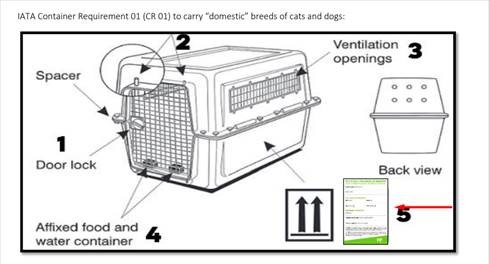
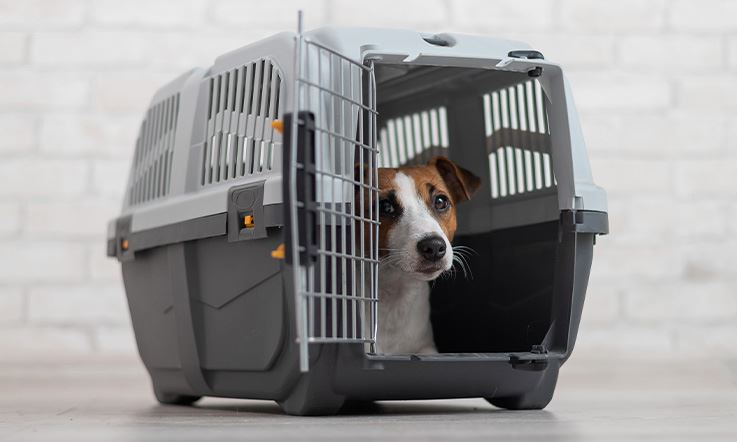
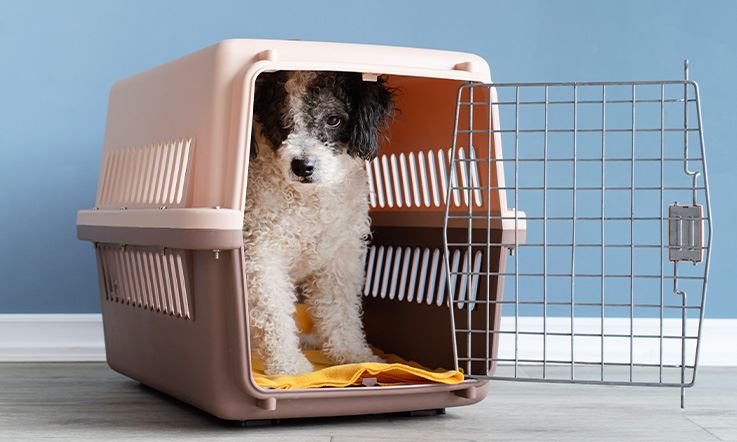
Exemplos de transportadoras rígidas permitidas no porão para animais de raças potencialmente perigosass:
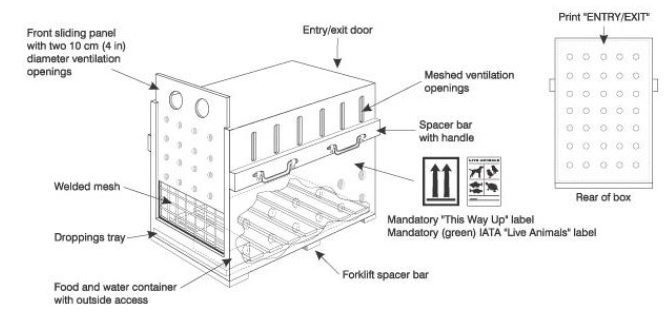
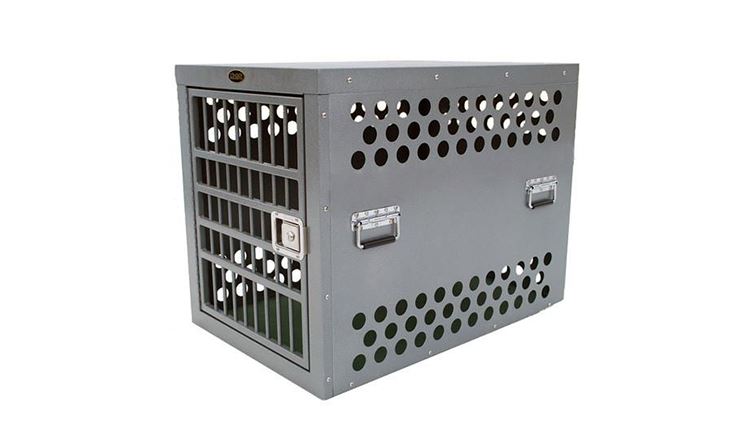
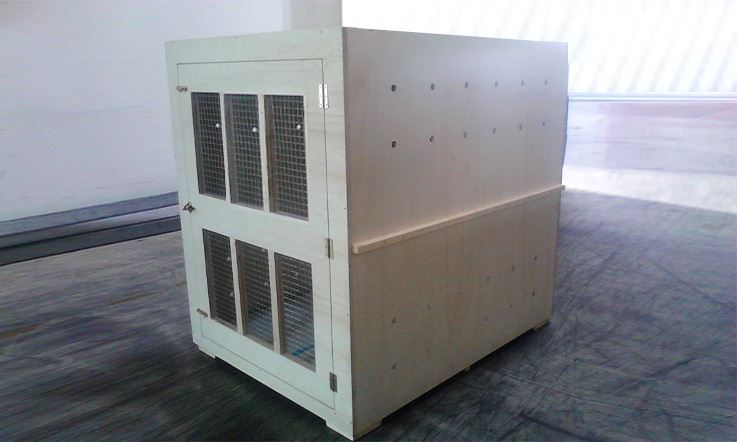
Exemplos de transportadoras rígidas NÃO PERMITIDAS:
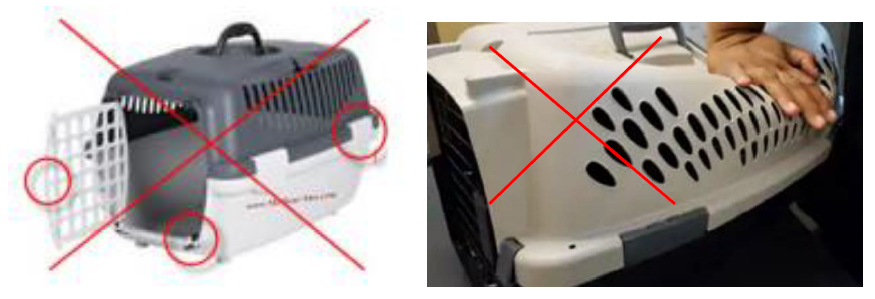
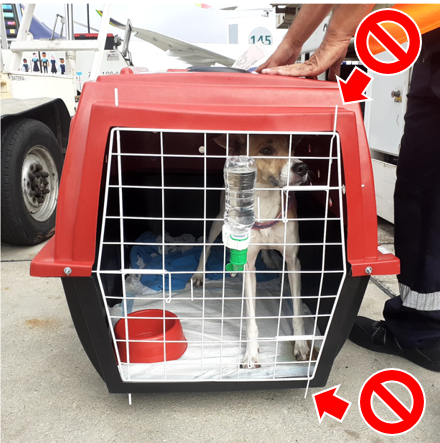
Dados fictícios ou falsos
Nas reservas PETC e AVIH, é extremamente importante que os dados introduzidos no pedido de serviço estejam correctos.
O peso introduzido deve ter sempre em conta o peso total do animal + transportadora. Verifique se o peso introduzido é o correcto. Certifique-se também de que as medidas da transportadora são as corretas, bem como a espécie e raça do animal.
A introdução de dados fictícios ou falsos, bem como as dimensões erradas da transportadora ou dados errados do animal a transportar, pode resultar em atrasos ou mesmo na recusa de embarque.
Controlo no Aeroporto / Checklist
Informamos que, de acordo com a Regulamentação IATA, é obrigatório efetuar um checklist de aceitação para AVIH e PETC. Deste modo, solicitamos que informem os clientes que será feita uma verificação para aceitação, no aeroporto.
Mudança de condição de trasnporte - PETC/AVIH
Sempre que a condição de transporte do animal não for a mesma para toda a viagem, ou seja, se o animal for transportado numa parte da viagem como AVIH e na seguinte como PETC, ou vice-versa, são necessárias 3 horas entre voos no ponto de transferência.
Outras condições:
- Gatos ou cães que estejam acostumados a coabitar podem ser enviados na mesma caixa transportadora. Neste caso, não devem pesar mais de 14 kg cada um.
- até três crias da mesma ninhada, com um máximo de 14kg cada e com menos de 6 meses de idade, também podem ser enviadas juntas na mesma caixa de transporte desde que tenham espaço para se movimentar;
- O passageiro deve providenciar comida e água suficientes para toda a viagem, uma vez que não é possível alimentar ou exercitar os animais em caso de trânsito.
- A caixa de transporte do animal é entregue aquando da aceitação do passageiro no check-in e colocada na área climatizada do porão.
- O código de serviço (SSR) na reserva é AVIH.
- insira também os códigos obrigatórios:
- NORM - se o peso for igual ou inferior a 32Kgs .
- LARGE - se o peso for superior a 32Kgs e até 45Kg.
- deve ser inserida no SSR a raça do animal (cão/gato) em inglês. Veja exemplos de entradas mais abaixo.
- Um menor não acompanhado (UMNR) não pode levar um AVIH.
Raças de cães potencialmente perigosas
Os cães de algumas raças poderão ser considerados como “potencialmente perigosos”, estando o seu transporte sujeito a condições especiais. Para transportar um cão de uma destas raças num voo da TAP, é obrigatório o uso de uma caixa especial em madeira ou metal – uma transportadora CR82 (veja acima).
A TAP Air Portugal aceitará as raças de cães mencionadas abaixo (e as suas misturas) a partir dos 6 meses de idade apenas em canis reforçados de acordo com o Regulamento IATA sobre trasnportadoras, requisito 82.
Os Animais de Assistência (SVAN – Service Animals) não estão sujeitos ao cumprimento desta regra.
Consulte as raças dos cães considerados "potencialmente perigosos": Cão de fila brasileiro; Dogue argentino; Pit bull terrier; Rottweiller; Tosa inu.
Não são aceites para transporte no porão cães e gatos de raças braquicefálicas
Os animais de raças braquicefálicas têm vias respiratórias anatomicamente restritas que dificultam a sua respiração. Viajar no porão pode ser perigoso e por isso não é recomendado.
Os animais de raças braquicefálicas, ou seja, que possuem o focinho curto e achatado que estiverem dentro do limite de peso e medidas para viajar na cabina, poderão ser reservados como PETC.
Lista de raças de cães e gatos (e mistura de raças) braquicéfalas cujo transporte no porão não é permitido pela TAP:
|
Raças de cães:
|
Raças de Gatos:
|
|
Affenpinscher
|
Birmanês
|
|
Boston Terrier
|
Exótico
|
|
Boxer
|
Himalaio
|
|
Bulldog (todos os tipos)
|
Persa
|
|
Bully Americano
|
Scottish Fold
|
|
Cavalier King Charles
|
|
|
Chihuahua
|
|
|
Chin Japonês / Spaniel Japonês
|
|
|
Chow Chow
|
|
|
Griffon de Bruxelas
|
|
|
Lhasa Apso
|
|
|
Mastim (todos os tipos) / Cane Corso
|
|
|
Pequinês
|
|
|
Pug (todos os tipos)
|
|
|
Shar-Pei / Shar-Pei Chinês
|
|
|
Shih-Tzu
|
|
|
Spaniel tibetano
|
|
|
Staffordshire Americano / ”Amstaff”
|
|
|
Staffordshire Bull Terrie / ”Staffys”
|
|
|
Toy Spaniel Inglês / Prince Charles Spaniel
|
|
Nota
Os animais acima mencionados ou cruzamentos de animais serão aceites se:
- For apresentada uma declaração veterinária a informar que o animal foi submetido a uma intervenção cirúrgica para melhorar o seu estado, e/ou não apresenta as características da raça.
- Tratando-se de um cruzamento de raças, deve ser apresentada uma declaração veterinária em que se declare que o animal não tem as características das raças originais.
Informação importante sobre o transporte de animais no porão
A TAP Air Portugal não defende o uso de tranquilizantes ou sedativos porque baixam a pressão sanguínea, especialmente a grande altitude, o que pode ser fatal para os animais quando viajam no porão de carga dos aviões.
Os custos associados ao transporte de animais como carga são apenas válidos à partida de Portugal. Para outros países podem ser aplicadas outras taxas. Para mais informação, contacte a TAP Air Cargo.
Exemplo de Entradas de GDS - AVIH
Amadeus
SRAVIH-NORM. 2 MAINE COON CATS 70X80X60CM/15KG /P1
SRAVIH-LARGE.DOG GERMAN SHEPHERD 120X80X60CM/33KG /P1/S2
Galileo
SI.P1S1/AVIH*NORM.2 MAINE COON CATS 15KG 70X80X60CM.CAT
SI.P1S1/AVIH*LARGE.GERMAN SHEPHERD 33KG 120X80X60CM.DOG
Sabre
3AVIH/NORM 15KG 57X37X36CM 2MAINE COON CATS-1.1
3AVIH/LARGE 33KG 120X80X60CM DOG GERMAN SHEPHERD-1.1
SVAN - Cães de Assistência na Cabina
SVAN - Cães de Assistência na Cabina
Os cães de assistência permitidos a bordo dos nossos voos devem ter uma idade mínima de 10 semanas e podem ser do tipo:
|
Cão-guia
|
Cão-ouvinte |
Cão de serviço
|
|
Cão treinado ou em fase de treino para auxiliar pessoas com deficiência visual.
|
Cão treinado ou em fase de treino para auxiliar pessoas com deficiência auditiva. |
Cão treinado ou em fase de treino para auxiliar pessoas com deficiência mental, orgânica ou motora.
|
Os cães de assistência, independentemente da raça ou tipo, são transportados pela TAP sem qualquer custo e têm direito a viajar no interior da cabina. São também aceites na operação TAP os SVAN em treino quando acompanhados pelo seu treinador ou família de acolhimento. Consideram-se famílias de acolhimento as que recebem os cães de assistência durante a fase de socialização e adaptação do animal à convivência humana e que estejam credenciadas como tal.
O que é necessário para o passageiro poder voar com cão de assistência
Este serviço de assistência deve ser pedido com pelo menos 48 horas antes do voo através deste formulário ou num balcão de atendimento do aeroporto. (O pedido deste serviço implica a reserva de lugares específicos nos nossos aviões, pelo que, a antecedência do mesmo é fundamental para evitar constrangimentos de última hora.)
No processo de aceitação dos SVAN de/para USA, a TAP confirmará o SVAN sem receber antecipadamente o DOT Form. Ainda assim, os passageiros devem ser sempre alertados que terão que apresentar o documento na escala, sob pena de, na sua falta, não serem aceites. Deste modo, aconselha-se sempre o envio antecipado do formulário.
Assim, o critério de confirmação do serviço na reserva passa a ser exclusivamente a quota disponível por voo/data.
O SSR referente a este serviço só será confirmado (HK) após verificação e aprovação do certificado pela área competente.
- Garantir que o cão está devidamente identificado como Animal de Assistência (SVAN).
- Apresentar, no momento da reserva, um certificado de treino1 do cão emitido por uma institutuição reconhecida.2
- Garantir que o cão tem passaporte animal, emitido por um veterinário, que ateste a sua identificação e a vacinação antirrábica, ou, em países que não emitem passaportes de animais, um certificado de saúde veterinário oficial.
- Comprovar o cumprimento dos requisitos sanitários legalmente exigidos;
- Comprovar o cumprimento das obrigações relativas ao seguro de responsabilidade civil.
Notas:
1A certificação do treino do animal como cão de assistência é feita através da emissão de um cartão próprio e distintivo, emitido pelo estabelecimento nacional ou internacional de treino de cães de assistência. Neste estabelecimento é emitido um cartão de identificação para as famílias de acolhimento e para os cães de assistência em treino. Veja aqui um ID Card (PDF, 1MB, EN) de exemplo como prova de certificação.
Em cumprimento com o Decreto-Lei n.º 74/2007, de 27 de março, a TAP Air Portugal reconhece a certificação emitida pelas seguintes entidades ou entidades reconhecidas por estas:
Internacionais
Nacionais
2Nos voos de/para os EUA, não é necessária a apresentação deste certificado.
Relembramos que:
- nos voos dentro da Europa/Africa o certificado da DOT não é valido;
- os passageiros devem ter certificado de treino reconhecido por escola internacionalmente reconhecida para os voos que não sejam de/para USA;
- excecionalmente aceitam-se os SVAN nos voos da Europa e Africa para os EUA, em trânsito em LIS, sem o envio do certificado de treino reconhecido por escola internacionalmente reconhecida.
Formulários a preencher para voos de/para E.U.A
Por determinação do Centers for Disease Control and Prevention (CDC), a partir de 1 de agosto de 2024, o transporte de cães para os Estados Unidos da América fica sujeito ao cumprimento de novas normas devido ao risco de transmissão de raiva (https://www.cdc.gov/importation/dogs/).
Estas normas aplicam-se a todos os cães de estimação (transportados na cabina e porão) e cães de assistência que devem cumprir os seguintes requisitos:
- Ter mais de 6 meses de idade
- Ter microchip
- Viajar com formulário de importação de cães do CDC - Animal Importation Form
- Poderá consultar as instruções de preenchimento do formulário AQUI.
Os cães com vacinação antirrábica administrada fora dos Estados Unidos da América e provenientes de países de alto risco, cuja listagem pode ser verificada aqui - High-Risk Countries for Dog Rabies | Importation | CDC -, devem entrar apenas pelos aeroportos aprovados pelo CDC e que poderão ser consultados AQUI.
Nota: No dia da viagem, os passageiros deverão dirigir-se ao balcão de Check-in com a maior antecedência possível para validação da documentação. Consulte os tempos de abertura check-in AQUI.
Nos voos de/para os EUA, não é necessário apresentar o certificado de treino do cão. Contudo, deverão ser preenchidos e submetidos no momento da reserva, os seguintes formulários:
SVAN em Voos para o Reino Unido
Antes de transportar o animal de assistência (SVAN) para o Reino Unido,, o passageiro deverá contactar o aeroporto de destino (consultar abaixo os contactos para os aeroportos de Heathrow, Gatwick e Manchester).
É da responsabilidade do passageiro ter todos os documentos necessários para o transporte do seu animal. Para mais informação, consulte a página: Cães-guia e Cães de Assistência (página em inglês). Após aterrar, deverá aguardar a assistência no destino, para que toda a documentação seja confirmada antes de sair do avião.
Contactos dos serviços de assistência nos aeroportos de Heathrow, Gatwick e Manchester:
Aeroporto de Heathrow (LHR)
Pet checker: ARC Heathrow
Telefone: +44 (0) 208 745 7894
E-mail: [email protected]
URL: https://www.cityoflondon.gov.uk/services/animal-health-welfare/heathrow-animal-reception-centre
Aeroporto de Gatwick (LGW)
Pet checker: ARC Heathrow
Telefone: + 44 (0) 129 355 5580
E-mail: [email protected]
URL: https://www.animalaircare.co.uk
Aeroporto de Manchester (MAN)
Pet checker: ABM (Duty Manager)
Telefone: + 44 (0) 758 447 6200
URL: https://www.manchesterairport.co.uk/help/passenger-guides/pet-travel-scheme/
Como transportar o cão de assistência
Os cães de assistência viajam sempre na cabina. Para garantir a segurança e bem-estar de passageiros e animais, os cães de assistência têm que ser obrigatoriamente transportados nas seguintes condições:
- Sem transportadora, aos pés do dono.
- Sempre com a trela colocada.
- Sem ocupar um lugar de passageiro.
- Sem se movimentarem na cabina.
PETC e AVIH - Taxas de Serviço
PETC (na cabina) - até 8 kg
| |
Época Alta
|
Época Baixa
|
| |
Flytap
Online
Check-in
|
Contact
Center
|
Agências de Viagem
Balcões Apt.
|
Flytap
Online
Check-in
|
Contact
Center
|
Agências de Viagem
Balcões Apt.
|
|
Portugal (voos domésticos)
|
50 EUR
59 USD
80 CAD
|
53 EUR
63 USD
84 CAD
|
55 EUR
65 USD
87 CAD
|
40 EUR
49 USD
65 CAD
|
43 EUR
52 USD
69 CAD
|
45 EUR
54 USD
72 CAD
|
|
Europa (incl. Marrocos e Tunísia),
Israel e voos entre Accra e São Tomé
|
80 EUR
92 USD
125 CAD
|
83 EUR
95 USD
129 CAD
|
85 EUR
97 USD
132 CAD
|
70 EUR
81 USD
110 CAD
|
73 EUR
84 USD
114 CAD
|
75 EUR
87 USD
117 CAD
|
|
Voos Internacionais
|
170 EUR
190 USD
259 CAD
|
177 EUR
198 USD
270 CAD
|
180 EUR
201 USD
274 CAD
|
150 EUR
168 USD
229 CAD
|
157 EUR
176 USD
240 CAD
|
160 EUR
179 USD
244 CAD
|
AVIH (no porão) - até 32 Kg
| |
Época Alta
|
Época Baixa
|
| |
Contact
Center
|
Agências de Viagem
Balcões Apt.
|
Contact
Center
|
Agências de Viagem
Balcões Apt.
|
|
Portugal (voos domésticos)
|
88 EUR
101 USD
137 CAD
|
90 EUR
103 USD
140 CAD
|
78 EUR
90 USD
122 CAD
|
80 EUR
92 USD
125 CAD
|
|
Europa (incl. Marrocos e Tunísia),
Israel e voos entre Accra e São Tomé
|
128 EUR
144 USD
196 CAD
|
130 EUR
146 USD
199 CAD
|
118 EUR
133 USD
181 CAD
|
120 EUR
136 USD
184 CAD
|
|
Voos Internacionais
|
247 EUR
274 USD
374 CAD
|
250 EUR
277 USD
379 CAD
|
227 EUR
252 USD
344 CAD
|
230 EUR
255 USD
349 CAD
|
AVIH (no porão) - mais de 32kg e até 45kg
| |
Época Alta
|
Época Baixa
|
| |
Contact
Center
|
Agências de Viagem
Balcões Apt.
|
Contact
Center
|
Agências de Viagem
Balcões Apt.
|
|
Portugal (voos domésticos)
|
138 EUR
155 USD
211 CAD
|
140 EUR
157 USD
214 CAD
|
128 EUR
144 USD
196 CAD
|
130 EUR
146 USD
199 CAD
|
|
Europa (incl. Marrocos e Tunísia),
Israel e voos entre Accra e São Tomé
|
238 EUR
264 USD
361 CAD
|
240 EUR
266 USD
364 CAD
|
228 EUR
253 USD
346 CAD
|
230 EUR
255 USD
349 CAD
|
|
Voos Internacionais
|
317 EUR
350 USD
479 CAD
|
320 EUR
353 USD
484 CAD
|
297 EUR
328 USD
449 CAD
|
300 EUR
331 USD
454 CAD
|
Os valores acima apresentados indicam os preços por percurso e serão cobrados na moeda local, de acordo com a taxa de câmbio em vigor. Estes serviços não são reembolsáveis.
Para transações realizadas fora da Europa, que usam uma moeda local diferente, o valor do serviço será convertido do valor fixo em USD para a moeda local (exceto Canadá).
Época alta: 15-Jul-25 a 31-Ago-25 / 12-Dez-25 a 05-Jan-26 / 27-Mar26 a 13-Abr-26
Época Baixa: resto do ano
NOTA IMPORTANTE
* Em certas rotas, por lei, o peso máximo será limitado a 32 kg. Para/de/via os seguintes dos países só é aceite AVIH até 32kgs (total animal + transportadora):
✓ EUA
✓ Hungria
✓ França
✓ Países Baixos
Dados fictícios ou falsos
Nas reservas PETC e AVIH, é extremamente importante que os dados introduzidos no pedido de serviço estejam correctos.
O peso introduzido deve ter sempre em conta o peso total do animal + transportadora. Verifique se o peso introduzido é o correcto. Certifique-se também de que as medidas da transportadora são as corretas, bem como a espécie e raça do animal.
A introdução de dados fictícios ou falsos, bem como as dimensões erradas da transportadora ou dados errados do animal a transportar, pode resultar em atrasos ou mesmo na recusa de embarque.
Transporte como Carga
Condições aplicáveis quando o peso do animal, incluindo a transportadora, excede os pesos máximos permitidos: 45kg / 99 lbs ou 32kg / 70 lbs no caso de voos com destino, origem ou escala em EUA, Hungria, França e Países Baixos. Nestes casos devem ser cumpridas as seguintes condições:
- O animal deve ter uma idade mínima de 12 semanas (10 semanas para Açores, Madeira e Espanha).
- O transporte deve estar previsto no percurso descrito no bilhete do passageiro.
- O animal é entregue para transporte 4 horas antes da partida. As condições/horários referentes à aceitação do animal podem diferir de acordo com o local de partida.
- O passageiro fornece todos os documentos necessários e responsabiliza-se por qualquer taxa adicional que lhe seja cobrada na origem e no destino.
- A TAP reserva-se o direito de decidir em que voo o animal é transportado.
- Não é permitido o transporte de animais braquicéfalos.
Notas:
- Nos voos com destino a Luanda, e partida de Lisboa, os animais só são aceites como carga.
- O transporte de aves com destino ao Aeroporto de Guarulhos (São Paulo) poderá ser realizado como carga.
- O transporte de animais de porte incomum, répteis ou roedores só poderá ser aceite como carga!
Para mais informações, reservas e preços de transporte deve contactar a TAP Cargo.
Requisitos e documentos em voos entre estados-membro da UE
Requisitos e documentos obrigatórios em voos entre estados-Membro da União Europeia
Os requisitos sanitários e os documentos abaixo mencionados são obrigatórios em todos os movimentos não comerciais de animais de estimação em voos entre os estados-membros da UE1, ou de alguns países europeus não pertencentes à UE2 aderentes ao Passaporte de Animal de Companhia da União Europeia. Sugerimos que o passageiro se informe sempre junto do veterinário, ou da Direção Geral de Alimentação e Veterinária, sobre os requisitos e documentos necessários para o transporte não comercial de animais de companhia, para a data e destino específicos do voo pretendido.
- Identificação por microchip: o animal deve ter implantado um microchip que permita a sua identificação. Só são permitidos animais identificados por tatuagem se a mesma tiver sido aplicada antes de 03/07/2011 e mediante apresentação de prova escrita.
- Passaporte de animal de companhia da UE: tem que ser emitido por um médico veterinário autorizado pela autoridade competente do país de origem e atestar a identificação e a vacinação antirrábica do animal.
- Vacinação antirrábica válida: tem de ser administrada em data igual ou posterior à data da colocação do microchip.
- Termo de responsabilidade para transporte no porão: este documento só é necessário se o animal tiver de ser transportado no porão.
Animais entre as 10 e 12 semanas de vida não necessitam de apresentar identificação por microship, Passaporte de animal de companhia e vacinação antirrábica. Neste caso, os documentos necessários a apresentar são:
- Boletim sanitário de cães e gatos e Atestado sanitário passado por medico veterinário.
1Alemanha, Áustria, Bélgica, Bulgária, Chipre, Croácia, Dinamarca, Eslováquia, Eslovénia, Espanha, Estónia, Finlândia, França, Grécia, Hungria, Irlanda, Itália, Letónia, Lituânia, Luxemburgo, Malta, Países Baixos, Polónia, Portugal, República Checa, Roménia e Suécia.
2Andorra, Suíça, Ilhas Faroé, Gibraltar, Gronelândia, Islândia, Listenstaine, Mónaco, Noruega, São Marinho e Estado da Cidade do Vaticano.
Requisitos sanitários para deslocações com animais de companhia entre Portugal Continental e as Regiões Autónomas dos Açores e da Madeira
Os requisitos sanitários e os documentos abaixo mencionados são obrigatórios em todos os movimentos não comerciais de animais de estimação em voos entre Portugal Continental e as Regiões Autónomas dos Açores e da Madeira.
- Gatos não vacinados contra a raiva, de qualquer idade (em Portugal, a vacinação antirrábica não é obrigatória nestas espécies), e cães até aos 3 meses - devem fazer-se acompanhar com um atestado de saúde emitido por um médico veterinário clínico, que assegure que o animal, na data da realização do exame clínico, não apresentava sinais de doenças próprias da espécie e que se encontrava apto a viajar até ao destino;
- Cães com mais de 3 meses - devem apresentar o boletim sanitário ou passaporte com comprovativo da vacinação antirrábica válida. A identificação eletrónica é obrigatória antes desta vacinação;
- Gatos nascidos a partir de 25 de outubro de 2019 devem ser identificados eletronicamente até 120 dias após o nascimento. Gatos nascidos antes de 25 de outubro de 2019 devem ser identificados eletronicamente até 25 de outubro de 2022.
- O Passaporte de Animais de Companhia não é obrigatório.
- A desparasitação contra parasitas internos e externos é sempre aconselhável.
ATENÇÃO:
O transporte combinado como AVIH num trajeto e no outro como AVI não é permitido.
Regulamento de transporte para cães com corte de orelhas
Desde 1 de setembro de 2023, cães com corte de orelhas ou em que as mesmas tenham sido retiradas na sua totalidade sem ser por diagnóstico, tratamento de lesões, doenças ou infeção é proibida na Irlanda.
Para poder transportar o animal é necessário ter um certificado, emitido por um veterinário local, atestando que as orelhas do cão foram removidas devido a um objectivo veterinário específico. O pedido de licença deve ser feito electronicamente, pelo menos até 5 dias antes da viagem.
Pode consultar todas as informações nas seguintes páginas: legislação sobre corte de orelhas de cães 2023 e guia de importação.
Requisitos e documentos em voos de/para fora da UE
Requisitos e documentos obrigatórios em voos fora dos estados-membro da UE:
Antes de fazer qualquer viagem aérea para fora dos estados-membros da UE1 com o animal de estimação, sugerimos que o passageiro se informe sempre junto do veterinário, ou da Direção Geral de Alimentação e Veterinária, sobre os requisitos e documentos necessários para o transporte não comercial de animais de companhia, para a data e destino específicos do voo pretendido.
1 Exceto Andorra, Suíça, Ilhas Faroé, Gibraltar, Gronelândia, Islândia, Listenstaine, Mónaco, Noruega, São Marinho e Estado da Cidade do Vaticano por serem aderentes ao Passaporte de Animal de Companhia da União Europeia.
Para voos com origem fora dos estados-membros da UE, destaca-se o seguinte:
a) O Certificado Sanitário Oficial para Entrada na União Europeia tem uma validade de dez dias até à data dos controlos à chegada e de mais quatro meses para circulação pelos Estados Membros (exceto se a vacinação contra a raiva expirar antes).
b) O Passaporte de animal de companhia da União Europeia é válido para regresso, se a informação constante do mesmo não tiver sido alterada durante a estadia fora deste espaço. Se for alterada, é aplicável o Certificado Sanitário Oficial.
A partir de 01/01/2021 deixaram de ser válidos neste contexto os passaportes emitidos até aquela data no Reino Unido.
c) Se o destino final for Portugal, é obrigatório o preenchimento e submissão do formulário para comunicação da chegada. A submissão do formulário deverá ser feita com a maior antecedência possível e no máximo até 48 horas antes da chegada. Poderá obter o formulário e os contactos para onde o mesmo terá de ser enviado aqui.
É da responsabilidade do passageiro informar-se e ter em sua posse todos os documentos necessários para o transporte do animal.
Apresentamos, abaixo, alguns requisitos e documentação necessários para alguns dos nossos destinos mais procurados:
Voos para Portugal:
Os animais que viajam para Portugal, com origem em países fora da UE (incluindo o Reino Unido, exceto a Irlanda do Norte) devem submeter um pedido de entrada à DGAV pelo menos 48 horas antes da chegada.
Voos de/para o Reino Unido:
Voos com destino ao Reino Unido:
- Não é permitida a entrada de animais de estimação. A TAP não está autorizada a realizar o transporte de animais de estimação para o Reino Unido – com exceção de Animais de Assistência (SVAN – Service Animals) transportados na cabina.
Voos a partir do Reino Unido (exceto Irlanda do Norte):
- Identificação por microchip: O animal deve ter implantado um microchip que permita a sua identificação.
- Vacinação antirrábica válida: Tem que ser administrada em data igual ou posterior à data da colocação do microchip, e com uma antecedência mínima de 21 dias face à data da viagem. A vacina é administrada nos animais a partir das 12 semanas.
- Passaporte de animal de companhia da União Europeia: Veja o indicado acima na alínea b).
- Animal Health Certificate (AHC): Este documento tem de ser emitido por um veterinário oficial reconhecido pelo Department for Environment, Food and Rural Affairs (Defra), ou pelos governos Escocês ou Galês. O passageiro deverá confirmar junto do veterinário do animal se este atende a este requisito. O Animal Health Certificate tem uma validade de dez dias após a data de emissão. Se o destino for um dos estados-membros da UE, este certificado é o indicado em a).
Nota: A partir de dia 01 de Maio de 2022, PETC e AVIH não são aceites em voos com origem/trânsito no aeroporto de LGW . Para qualquer rota com origem de LGW, directa ou em trânsito, os animais de estimação devem ser transportados como carga.
Voos de/para o Brasil
Voos com destino ao Brasil:
- Documentação válida obrigatória: A entrada de animais de estimação no Brasil só é permitida mediante a apresentação do Certificado Veterinário Internacional1 não sendo assim válido o Passaporte Europeu para Animais de Estimação. À exceção de cães e gatos, todos os outros animais que entrem no país como carga, através da TAP Air Cargo, necessitam apresentar uma Licença de Importação emitida pelo Ministério da Agricultura, Pecuária e Abastecimento.
- Transporte de aves para Guarulhos: O transporte de aves com destino ao Aeroporto de Guarulhos (São Paulo) deverá ser realizado como carga.
- Para mais informações sobre o transporte de animais por via aérea para o Brasil, consulte os links informativos abaixo:
- Voos de ligação operados pela GOL e Azul: Não são aceites passageiros que transportem animais no porão (AVIH) ou na cabina (PETC) e que possuam voos de ligação dentro do Brasil operados pela GOL (G3) e pela Azul (AD). Esta regra aplica-se a todos os voos operados por estas companhias mesmo que o número de voo marketing seja TP. Os passageiros devem entrar em contato diretamente com cada companhia aérea.
Voos a partir do Brasil para a UE:
- Certificados Veterinários Internacionais (CVI): Desde 01 de novembro de 2022, a emissão de CVIs para a União Europeia, Noruega e Suíça passou a ser realizada por via eletrónica2. Veja aqui todas as informações.
- Se o passageiro precisa transportar animais por via aérea do Brasil para a União Europeia, poderá consultar o que precisa de fazer neste documento.
1São válidos para regresso ao Brasil, quer o certificado sanitário oficial emitido no Brasil para entrar na União Europeia, quer o passaporte brasileiro, desde que não tenham decorrido mais de 60 dias, respetivamente, a partir da data de emissão do certificado oficial e a partir da de saída do animal averbada no passaporte, e desde que a vacinação contra a raiva permaneça válida.
2Os e-CVIs dos animais de estimação que tenham como destino ou estejam em trânsito para a Alemanha, Itália, Suécia e Países Baixos deverão ser chancelados. Para os restantes países da União Europeia não é necessário chancela, basta a assinatura digital do médico veterinário oficial do Vigiagro/MAPA.
Voos para a Irlanda (DUB)
Os passageiros provenientes de países fora da União Europeia que transportem animais para o Aeroporto de Dublin por via aérea têm, obrigatoriamente, de informar as autoridades veterinárias irlandesas da chegada dos mesmos com uma antecedência mínima de 24 horas. O horário de chegada de animais provenientes de países fora da UE terá de ser no período compreendido entre as 07h00 e as 21h00, nos 7 dias da semana. O embarque só será feito se a verificação do controlo veterinário for confirmada. Consulte a informação detalhada por país de origem no Portal Pet Travel.
Voos para os EUA
Por determinação do Centers for Disease Control and Prevention (CDC), a partir de 1 de agosto de 2024, o transporte de cães para os Estados Unidos da América fica sujeito ao cumprimento de novas normas devido ao risco de transmissão de raiva (https://www.cdc.gov/importation/dogs/).
Estas normas aplicam-se a todos os cães de estimação (transportados na cabina e porão) e cães de assistência que devem cumprir os seguintes requisitos:
- Ter mais de 6 meses de idade
- Ter microchip
- Viajar com formulário de importação de cães do CDC - Animal Importation Form
- Poderá consultar as instruções de preenchimento do formulário AQUI.
Os cães com vacinação antirrábica administrada fora dos Estados Unidos da América e provenientes de países de alto risco, cuja listagem pode ser verificada aqui - High-Risk Countries for Dog Rabies | Importation | CDC -, devem entrar apenas pelos aeroportos aprovados pelo CDC e que poderão ser consultados AQUI.
Nota: No dia da viagem, os passageiros deverão dirigir-se ao balcão de Check-in com a maior antecedência possível para validação da documentação. Consulte os tempos de abertura check-in AQUI.
Voos em trânsito/para África do Sul
Não são aceites PETC/AVIH em voos com destino/trânsito na África do Sul a menos que se manifeste como Carga - Saiba mais emTIMATIC (GDS).
Voos de/para Angola
Para as viagens entre Lisboa e Luanda, o transporte de animais em porão não pode ser aceite. Aconselha-se a contactar previamente o Departamento de Carga.
Alteração da Condição de Transporte - PETC/AVIH
Sempre que a condição de transporte do animal não for a mesma para toda a viagem, ou seja, se o animal for transportado numa parte da viagem como AVIH e na outra como PETC, ou vice-versa, são necessárias 3 horas entre voos no ponto de transferência.
TAP Miles&Go Pets
Porque somos uma companhia Pet Friendly, os Clientes TAP Miles&Go ganham milhas ao viajar em voos operados pela TAP com os seus animais de companhia. Seja na cabina ou no porão, podem obter até 500 milhas ao levar os seus fiéis companheiros nos nossos aviões!
Basta inserir normalmente o número de passageiro frequente TAP Miles&Go no PNR.
Esta oferta não se aplica no caso de os clientes viajaram com bilhetes-prémio ou outro tipo de bilhetes não elegíveis para acumular milhas.
